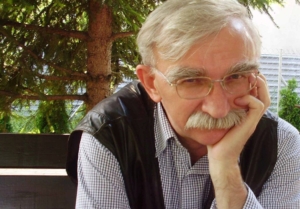Why do I do what I do?

In tonight’s blog, guest writer Ryszard Chciuk asks a question I think we have all wondered at one time or another: Why do I do what I do?
Contributing to someone’s improvement and understanding is the reason I do what I do.
Who said that? If you don’t know yet, please keep on reading.
This article is about the meaning of one’s live.
Jim Collins said in Good to Great: … it is impossible to have a great life unless it is a meaningful life. And it is very difficult to have a meaningful life without meaningful work.
Victor Frankl in Man’s Search for Meaning (over 12 million copies sold) says: … striving to find a meaning in one’s life is the primary motivational force in man. Victor Frankl also claims that Man … is able to live and even to die for the sake of his ideals and values! He also said: There is nothing in the world, I venture to say, that would so effectively help one to survive even the worst conditions as the knowledge that there is a meaning in one’s life. It has been said by a man who survived three years in four German concentration camps, including Auschwitz.
In that book Victor Frankl reminded results of several public opinion polls: The results showed that 89 percent of the people polled admit that man needs something for the sake of which to live, around 60 percent of the people polled conceded that there was something, or someone, in their own lives for whose sake they were even ready to die. In the statistical survey of 8 thousand students of 48 colleges, conducted by social scientists from Johns Hopkins University, students were asked what they considered “very-important” to them now. 16 percent of the students checked “making a lot of money”; 78 percent said their first goal was “finding a purpose and meaning to my life.”
The polls were made some time ago, but my experience tells me the latest results would be much worse. I mean there are much more students and adults interested in earning more money and fewer people searching for the meaning of their lives. Using Frankl’s words: they are caught in that situation which I have called the “existential vacuum”. For such a man No instinct tells him what he has to do, and no tradition tells him what he ought to do; sometimes he does not even know what he wishes to do. Instead, he either wishes to do what other people do (conformism) or he does what other people wish him to do (totalitarianism).
To complete this long introduction, I will remind only one sentence from Friedrich Nietzsche: He who has a why to live can bear with almost any how.
A company does not have its brain (at least at the beginning of the 21st century), so it can not suffer from the existential vacuum. The feeling of meaninglessness is not painful for a company. But no organization exists without the brains of its employees and managers. If you, as their leader, are aware that a significant part of your staff is searching for the meaning of their lives or suffering from the existential vacuum, you should help them. I do not expect you will create an internal department of logotherapy. Nevertheless, why you could not extend the medical healthcare package and allow some of your people to visit a logotherapist?
Anyway, I believe the person searching for the meaning of his life will be inspired by the mission of the team he is a part of, and adopt it as a kind of response to his problem. And those who already have a sense of meaning will find that working for you helps them to fulfill their life mission.
My life mission is to leave the world when it is a little bit better than it was before I arrived here. Does it sound general, audacious, pompous? Not for me, but as a manager, I made my mission’s definition more specific. I utilized over twenty years of experience collected during my service for the construction company. In that time, as a machine user and an internal service provider I believed I had learned the basic expectations of all machines’ users:
- The machine is ready to work always when it is needed
- The cost of operation is the lowest possible
When I got a chance to attend the creation of a new dealership for Volvo CE, I expressed my new after-sales department mission as follows:
- We provide machine users with the highest machine availability at the lowest cost of operation,
- by delivering service works exceeding customers’ expectations,
- and keeping profitability on the level assuring steady development of the service department and securing financial liquidity of our dealership in a downturn in the economy.
That mission statement became a basic foundation for defining our department’s vision and the main principles (values).
The life mission has to be adapted to the changing conditions, so since I got retired, I feel personally obliged not to spoil our planet to a higher degree than the average homo sapiens does. It comprises also sharing my experience in the construction industry with my successors. I would like them to avoid my mistakes. This is the reason to write posts for the Learning Without Scars blog and to publish articles on my blog dedicated to construction machine users and their closest collaborators – after-sales departments personnel (only in Polish – note: and they are all excellent).
I owe you a response to the question I started my blog post with. This is Ron Slee answer to the most important question a human being has to ask himself: why do I do what I do? Helping students of The Learning Without Scars to succeed is his, and his company mission, his WHY.
Dear reader, what is your mission, what is your WHY, have you already found the meaning for your life?
As Ron says, the time for your answer is now.
Did you enjoy this blog? Read more great blog posts here.
For our course lists, please click here.



